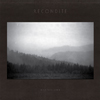In hindsight, Acid Test made a shrewd decision in signing Recondite’s debut album last year. Though back then he wasn’t known for making acid, the mournful German nonetheless found a perfect home alongside Tin Man and the label’s other introverts. But if that album was Recondite expertly painting rainbows with just a single color — 303 — his second LP, Hinterland, a stark mix of pine-tree green and snow white, may be even more compelling. It’s one of those records which perfectly evokes its title and cover art. This is best observed in serene tracks like “Leafs” and “Still,” whose delicately balanced percs rustle about plodding tech-house cores and deftly conjure wintry forest imagery.
Even as Recondite moves on to other moods and seasons, this early hit to the mind’s eye never fully fades. Shot through with delicate chords, the cheerful “Riant” feels much like a sunny but frigid day, while the gentle current of “Floe” describes exactly what it should. Just like a vast pine forest, however, a sense of primal savagery never lurks far from this tranquil surface. Throughout “Stems,” for instance, it’s easy to envisage a pack of wolves carefully stalking their prey. We never witness the kill itself, but in a peculiar way, the track’s sleek, purposeful momentum is all the more thrilling for that fact. “Abscondence” offers the reverse perspective, frantic synths darting back and forth like a terrified animal.
For all the imagery though, Hinterland doesn’t feel the least bit contrived. There’s no sampled animal noises or obvious field recordings on show. Instead, Recondite imbues his compositions with a fine sense of balance and coherence that suggest enough on their own. Through similar tracks like “Still” and “The Fade,” it’s clear we’re meant to experience different aspects of the same windswept landscape. It might be the album’s greatest triumph that these closely related scenes can be presented one after the other without monotony setting in.
As did On Acid, Hinterland shows an extraordinary ability for expression in spite of its limited palette. In “Fey,” for example, the fitful movements of a rough-hewn shaker change the number’s entire feel, though the other elements are all generic to the album. In allowing himself a slightly wider set of sounds to work with, Recondite has blessed his second album not only with a greater range of moods, but with an even greater sense of personal identity. And really, artists and listeners alike can’t ask for much more than that.
















